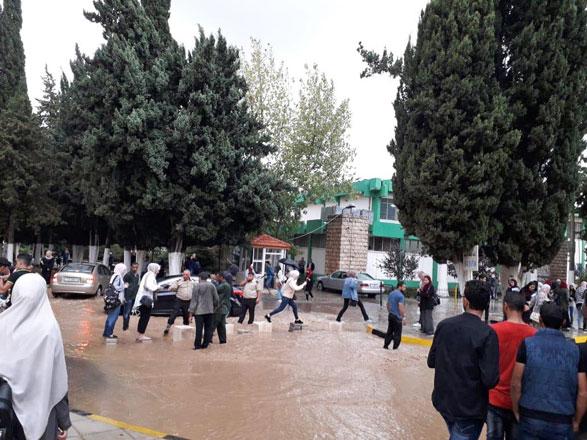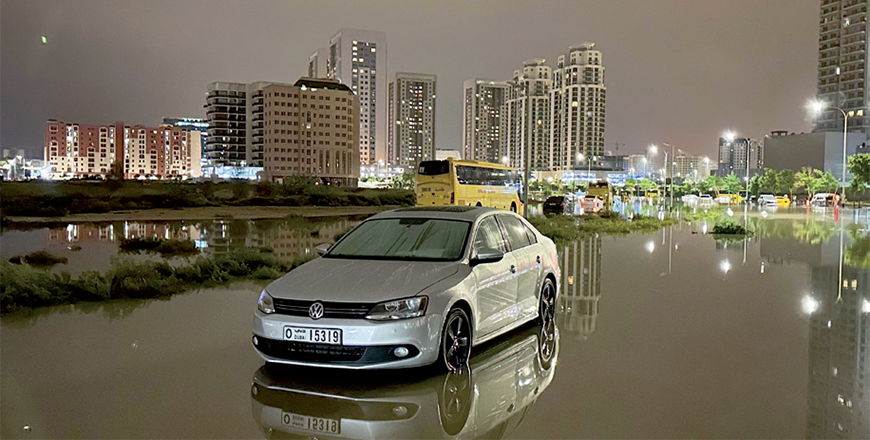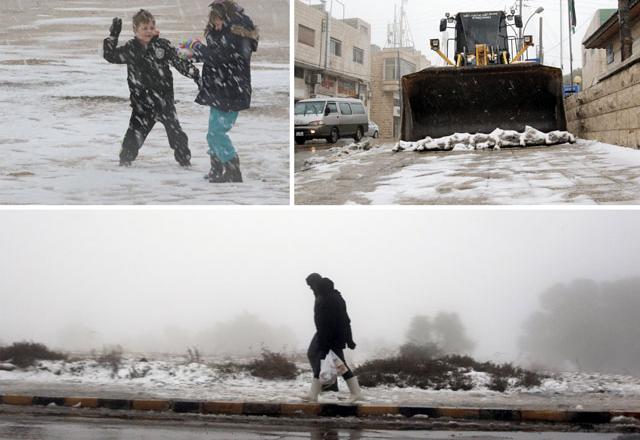You are here
First rainfall of season sparks joy, then anger
By Maram Kayed - Oct 28,2018 - Last updated at Oct 28,2018

Students at the University of Jordan said the university was ‘flooded’ with water, which occurs every time it rains (Photo courtesy of Facebook)
AMMAN — Jordanians were quick to welcome the first rainfall of the winter season with photos and videos posted to social media, but soon the traffic, streams of water running through the streets and highway collapses changed the tone.
“It took me an hour to get home when it usually only takes me 20 minutes. All of this because it rained for around half an hour. What is going to happen later in the season when it might rain all day?” said George Ayoub, a citizen in Amman.
Citizens going home from Amman to the governorates noted that the traffic delayed them for two to three hours. Sanaa Freihat, who lives in Amman and commutes to Irbid every day, said: “The road was slippery and some people were driving hysterically, so most drivers were going slowly and carefully, which was the right choice despite the delay.”
Many people used social media to express their frustrations over being stuck in traffic, with many of them posting photos of the long, car-filled roads ahead of them with the caption: “Thank God it was only five minutes worth of rain.”
Another issue for citizens around the country were the streams of water running through the streets of some areas. Citizens noted that the drains in some places “became quickly clogged”, which caused the streams.
“It’s already hard waiting for the bus, but doing it with freezing water in your shoe is even harder,” Lama Bustani, a student who was waiting for a bus in Sports City, told The Jordan Times.
Students at the University of Jordan also said the university was “flooded” with water, which occurs every time it rains.
Some blamed the poor infrastructure in Amman, saying that it is a problem they have been dealing with for years, while others said that the litter that some people throw clogs the drains, and so the blame “should [be] shared by government and people”.
A popular post circulating on social media read, “We throw cups, cigarettes and tissues, then complain about the infrastructure of the city”.
Spokesperson for the Greater Amman Municipality Mazen Farrajeen, told The Jordan Times that “the municipality has been making regular checks on the drainage system in Amman since late August, but some of them are too old and need replacement”.
Road and bridge collapses were an additional point of focus for discontented citizens. Most notably, the Dead Sea collapse that resulted in 21 deaths, 35 injuries and a missing body which lead to the day to being called “Black Thursday”.
Several other roads were affected by the rain, however, such as the Ajloun, Jerash and Irbid highways. Authorities reported that the collapses “will be dealt with immediately” and that “there will be no blockages on any of the mentioned roads”.
Nevertheless, citizens took to Twitter, Facebook and Instagram to express their anger at the “poor state of roads and bridges” which they attributed to “corruption and fraud by high government authorities”.
Abdel Salam Abbadi, a doctor, Tweeted, “roads like the Dead Sea’s and others probably have millions attributed to them in funds, and the are under construction for years and years, only for them to collapse after the first rainfall of the season”.
People also took to social media to popularise the trending hashtag, “we will not forgive the corrupted”.
Related Articles
BAGO, Myanmar — Rescuers in boats negotiated muddy waters on Thursday to reach thousands stranded in central Myanmar after a dam overflowed,
DUBAI — Dubai's giant highways were clogged by flooding and airport passengers were urged to stay away on Wednesday as the glitzy financial
AMMAN — Hundreds of people were evacuated during the weekend when heavy rainfall sparked flooding of several houses and streets, and snow bl


















